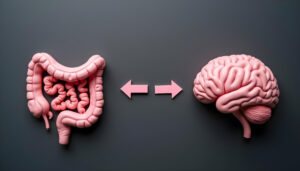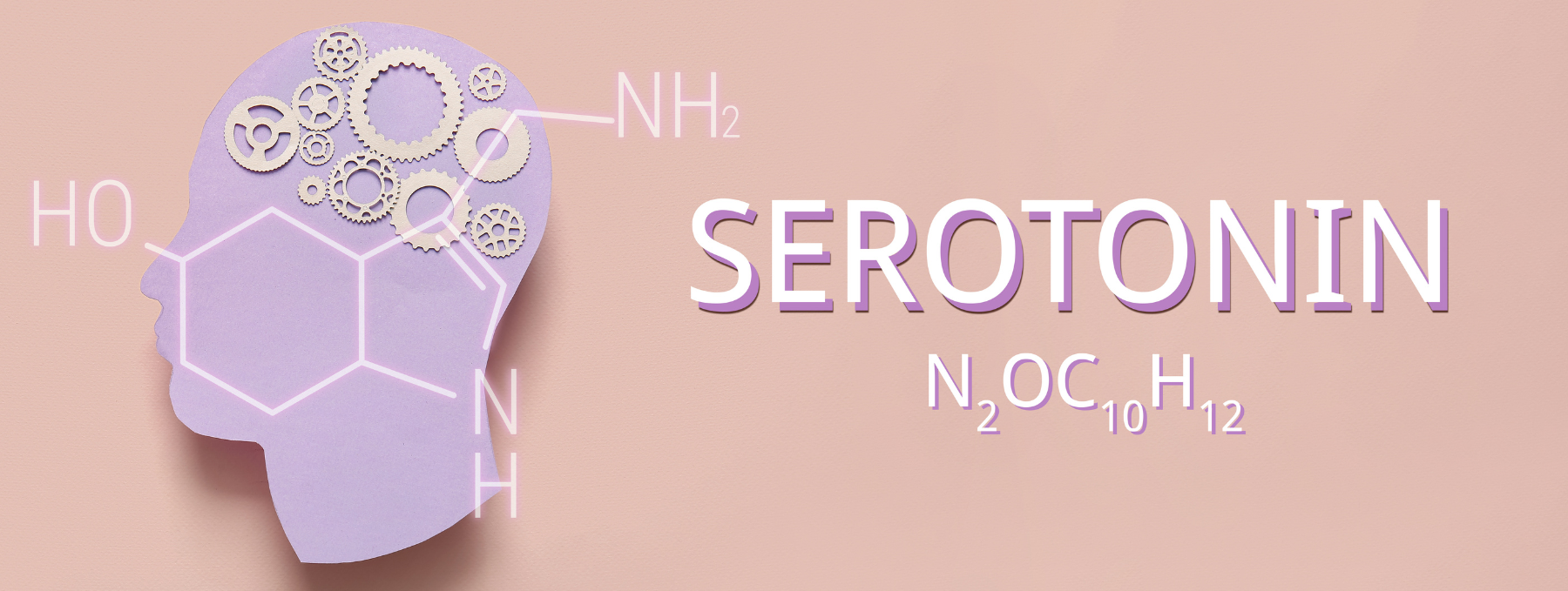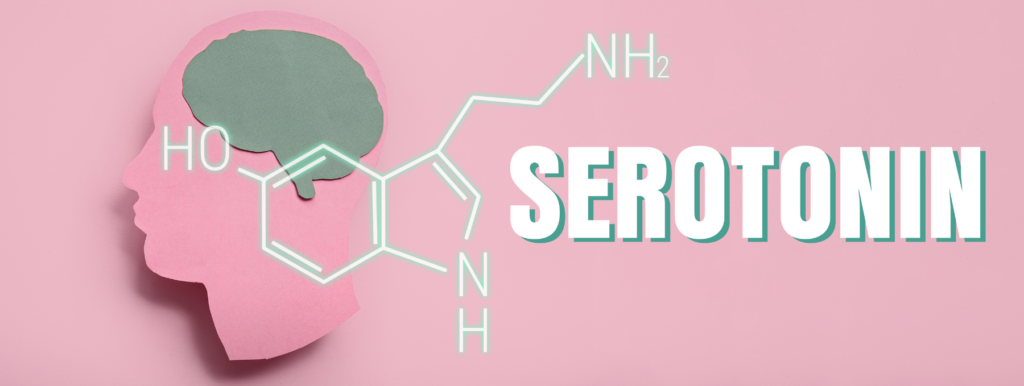Serotonin is a crucial neurotransmitter that significantly influences mood regulation, mental health, and numerous bodily functions. A deficiency in serotonin can lead to a wide range of psychological and physical symptoms, including depression, anxiety and gastrointestinal problems. Gaining insights into the causes of serotonin deficiency is vital for creating effective treatment strategies and interventions. In this article, we will explore the various factors contributing to this condition, focusing on biological, psychological and environmental influences.
The Role of Serotonin in the Body
Often referred to as the “feel-good” neurotransmitter, serotonin is crucial not only for mood regulation but also for numerous bodily functions. Serotonin significantly influences sleep cycles by affecting melatonin production, contributing to better sleep quality and emotional stability. Additionally, serotonin plays a vital role in modulating appetite and digestion, as it helps to signal feelings of satiety and facilitate smooth muscle contractions in the gastrointestinal tract, where about 90% of the body’s serotonin is produced. Beyond these roles, serotonin is also essential for cognitive functions such as memory and learning, as it enhances the synaptic plasticity necessary for forming new memories.
 Given its wide-ranging impact, serotonin deficiency can lead to various symptoms that affect both mental and physical health, including mood disorders, sleep disturbances, appetite changes and cognitive impairment. Understanding serotonin’s multifaceted role helps to underscore the importance of maintaining balanced levels for overall well-being.
Given its wide-ranging impact, serotonin deficiency can lead to various symptoms that affect both mental and physical health, including mood disorders, sleep disturbances, appetite changes and cognitive impairment. Understanding serotonin’s multifaceted role helps to underscore the importance of maintaining balanced levels for overall well-being.
What Causes Serotonin Deficiency?
Serotonin deficiency can be a serious concern that can significantly impact mood, behavior, overall mental health and more. Several underlying causes can lead to lowered serotonin levels, including biological elements such as genetics, psychological factors like stress and anxiety and environmental influences such as social environment and lifestyle choices. By examining what causes serotonin deficiency, we can gain insight into the complexities of this important neurotransmitter and its effects on the body and mind.
Biological Factors That Cause Serotonin Deficiency
A variety of biological factors including genetics, neurotransmitter interactions and hormonal changes play a significant role in regulating serotonin levels. Understanding the biological underpinnings of serotonin production is essential when it comes to identifying the root causes of serotonin deficiency.
Genetic Factors
Certain genetic factors can increase a person’s likelihood of experiencing serotonin deficiency. Variations in genes that are responsible for serotonin transport, receptor function and the synthesis of serotonin can lead to lower serotonin levels in the brain. For example, the 5-HTTLPR gene influences how effectively serotonin is reabsorbed by neurons. When this process is less efficient, it can create imbalances in serotonin levels. Additionally, changes in the 5-HT1A and 5-HT2A receptor genes can modify how sensitive these receptors are and how many there are, affecting how serotonin signals are processed in the brain. This disruption can play a role in mood disorders.
The TPH1 and TPH2 genes are essential for producing serotonin. Variations in these genes can affect how well serotonin is synthesized and how much is available for the body to use. Another important gene, COMT (Catechol-O-Methyltransferase), is involved in breaking down serotonin and other neurotransmitters. It influences serotonin balance by regulating how quickly serotonin is degraded.
Finally, the SLC6A4 gene, which codes for the serotonin transporter (SERT), determines how effectively serotonin is removed from the synapse (the space between neurons). This directly impacts serotonin’s effectiveness in signaling. Overall, these genetic influences highlight the complex nature of serotonin regulation and the varying genetic risks individuals may face regarding serotonin deficiency.
Neurotransmitter Imbalance
Serotonin is essential for regulating mood and works closely with other neurotransmitters like dopamine and norepinephrine. Together, they shape emotional health, motivation and cognitive abilities. An imbalance in any of these neurotransmitters can greatly impact serotonin’s production and effectiveness.
For instance, low levels of dopamine can diminish motivation and mood, creating a cycle that limits serotonin’s impact. Similarly, insufficient norepinephrine can interfere with both the production and function of serotonin, affecting emotional stability. Increased stress levels can raise norepinephrine production, which may hinder serotonin synthesis. This disruption can lead to symptoms like mood swings, anxiety, fatigue and cognitive decline.
Hormonal Changes

Hormones play a crucial role in regulating serotonin levels and overall mental health. Key life stages—such as puberty, menstruation, pregnancy and menopause—bring hormonal fluctuations that can affect serotonin production.
During puberty, rapid hormonal changes can lead to mood instability and increased susceptibility to mood disorders. In women, the menstrual cycle includes monthly hormonal shifts that may result in irritability and mood swings, often linked to drops in serotonin levels as estrogen decreases.
Pregnancy introduces additional hormonal changes. While some women may experience mood enhancements due to increased serotonin, others might face depressive symptoms. Menopause, marked by a significant reduction in estrogen, can further disrupt serotonin production and increase the risk of mood disorders.
Chronic Illness
Certain chronic conditions, such as diabetes and fibromyalgia, can impact serotonin levels. Chronic pain and inflammation can lead to altered neurotransmitter metabolism and ultimately decreased serotonin production, which affects mood and well-being.
Several medical conditions can contribute to serotonin deficiency as well, further complicating the interplay between health and mood regulation:
- Endocrine Disorders: Disorders affecting hormone production can influence serotonin synthesis. Conditions like hypothyroidism, which lead to an underactive thyroid, can result in lower serotonin levels and affect mood regulation.
- Autoimmune Diseases: Chronic inflammation seen in autoimmune diseases can disrupt the function of neurotransmitters, including serotonin. The body’s response to inflammation often includes a decrease in serotonin production.
- Neurological Disorders: Certain neurological conditions, such as migraines and epilepsy, have been associated with altered serotonin levels. What’s more, brain injuries or degenerative diseases can impact how serotonin is produced and utilized in the brain.
Psychological Factors That Affect Serotonin Levels
Psychological factors can significantly influence serotonin levels and play a critical role in emotional health. Conditions such as stress, anxiety and depression can lead to fluctuations in serotonin production and functioning. Exploring these psychological factors can help foster a better understanding of their impact on serotonin levels.
Stress and Anxiety
Chronic stress profoundly impacts serotonin levels, primarily through elevated cortisol, a hormone released during stressful situations. While cortisol is vital for managing short-term stress, prolonged cortisol elevation can hinder serotonin production and receptor sensitivity, disrupting mood regulation.
Persistent stress also leads to behavioral changes that compromise serotonin levels. Disrupted sleep patterns, common in stressful situations, impair serotonin synthesis and can exacerbate anxiety and depression. Similarly, stress-induced dietary shifts often result in unhealthy food choices, which can reduce the intake of essential nutrients like tryptophan, the precursor to serotonin. Thus, effective stress management is crucial for maintaining serotonin balance and overall emotional well-being.
Trauma and Emotional Distress
 Experiencing trauma or ongoing emotional distress can lead to significant changes in brain chemistry, which can affect serotonin levels. Such events can alter neurotransmitter regulation and trigger mental health disorders closely associated with serotonin deficiency, including Post-Traumatic Stress Disorder (PTSD), anxiety disorders and depression.
Experiencing trauma or ongoing emotional distress can lead to significant changes in brain chemistry, which can affect serotonin levels. Such events can alter neurotransmitter regulation and trigger mental health disorders closely associated with serotonin deficiency, including Post-Traumatic Stress Disorder (PTSD), anxiety disorders and depression.
For instance, individuals with PTSD often exhibit disrupted serotonin pathways, leading to symptoms like irritability and emotional numbness. Similarly, those suffering from anxiety and depression frequently show lower serotonin levels, which highlights the link between emotional distress and biochemical imbalances. Moreover, trauma can lead to unhealthy coping mechanisms, such as substance abuse or social withdrawal, which further compromise serotonin production and worsen feelings of isolation and despair.
Depression
Depression can create a self-perpetuating cycle of serotonin deficiency that significantly impacts mental health. Low serotonin levels have been linked to feelings of hopelessness and emotional numbness, common symptoms of depression. As these negative emotions intensify, they further trigger depressive symptoms, leading to even lower serotonin production.
This vicious cycle is challenging to break, as persistent sadness often diminishes motivation to engage in activities that could improve mood, such as exercise or social interactions—both of which can enhance serotonin levels. Over time, this cycle can complicate recovery, making it crucial to implement targeted therapeutic interventions like medication, cognitive-behavioral therapy or lifestyle changes.
Environmental Factors That Affect Serotonin Levels
Environmental factors play a critical role in influencing serotonin levels and, consequently, overall mental health. Elements such as lifestyle choices and social surroundings can significantly impact serotonin production. Understanding how these external conditions affect serotonin levels can provide valuable insights into effective ways to better manage mental well-being and foster healthier emotional states.
Lifestyle Choices
Several lifestyle choices can considerably impact serotonin levels, either positively or negatively. Below are some of the most common lifestyle factors that can lead to serotonin deficiency.
- Diet: Diets high in processed foods, sugars and unhealthy fats can contribute to serotonin deficiency. These types diets may lack essential nutrients needed for neurotransmitter synthesis, including tryptophan, vitamins and minerals. Consuming a well-balanced diet rich in whole foods, fruits, vegetables and lean proteins can improve serotonin synthesis. Additionally, nutrient-dense foods provide the necessary building blocks for neurotransmitters.
- Nutritional Deficiencies: The body requires specific nutrients to synthesize serotonin, and deficiencies in these key components can lead to lowered serotonin levels. One of the most critical nutrients is tryptophan, an amino acid that serves as a precursor to serotonin, due to the fact that low levels of tryptophan can significantly limit serotonin production. Additionally, certain vitamins, such as B6, B12 and folate, play pivotal roles in amino acid metabolism and neurotransmitter synthesis. A deficiency in these vitamins can impede serotonin production and functioning. Moreover, omega-3 fatty acids, found in sources like fish, flaxseeds and walnuts, are vital for maintaining membrane fluidity in neurons, which in turn impacts serotonin receptor function. Ensuring an adequate intake of these nutrients is essential for supporting optimal serotonin levels and overall mental health.
- Mindfulness and Relaxation Techniques: Practicing mindfulness, meditation or yoga can lower stress levels and enhance serotonin production. Mindfulness techniques focus on relaxation and emotional well-being, which can help counteract the negative effects of stress on serotonin levels.
- Light Exposure: Sunlight exposure has been linked to increased serotonin levels. Seasonal Affective Disorder (SAD), for example, illustrates the connection between light and serotonin. It is well known that many individuals experience serotonin deficiencies and low mood during winter months due to reduced sunlight.
- Exercise: Physical activity is known to boost serotonin levels. A sedentary lifestyle can hinder the natural production of serotonin, leading to deficiencies. Regular exercise promotes the release of serotonin and other neurotransmitters, and contributes to improved mood and emotional well-being.
- Sleep: Sleep is critical for overall health and well-being, and plays a role in the regulation of serotonin levels. Poor sleep hygiene can disrupt serotonin production, leading to symptoms of deficiency.
- Substance Abuse: Substances like alcohol and recreational drugs can significantly affect serotonin levels. While some substances may provide temporary boosts in serotonin, long-term use often leads to lower baseline levels of serotonin. Withdrawal from substances can also lead to further declines in serotonin production.
Social Environment
 A lack of social support and isolation can lead to feelings of loneliness and despair, which are closely linked to serotonin deficiency. Relationships play a crucial role in mental health and emotional stability. Social isolation can trigger a negative feedback loop in which feelings of loneliness contribute to anxiety and depression, further decreasing serotonin levels. Engaging in meaningful social interactions is vital for maintaining emotional health.
A lack of social support and isolation can lead to feelings of loneliness and despair, which are closely linked to serotonin deficiency. Relationships play a crucial role in mental health and emotional stability. Social isolation can trigger a negative feedback loop in which feelings of loneliness contribute to anxiety and depression, further decreasing serotonin levels. Engaging in meaningful social interactions is vital for maintaining emotional health.
Conversely, maintaining a strong social network provides emotional support and enhances feelings of belonging. Positive relationships have been shown to boost mood and promote increased serotonin production. On the other hand, toxic relationships or chronic interpersonal conflicts can lead to heightened stress and anxiety, adversely affecting serotonin levels. Constant exposure to stressors within social environments can amplify feelings of despair, further impacting mental health.
Medications and Treatments for Serotonin Deficiency
While understanding what causes serotonin deficiency is crucial, it’s equally essential to discuss potential treatment options. Below are a few of the most common treatments for serotonin deficiency.
- Antidepressants: Selective serotonin reuptake inhibitors (SSRIs) are commonly prescribed to increase serotonin levels in the brain. They work by preventing the reabsorption of serotonin, making more of it available to improve mood. Another class of antidepressants, monoamine oxidase inhibitors (MAOIs), work by blocking the action of monoamine oxidase, an enzyme that breaks down serotonin and other neurotransmitters. By inhibiting this enzyme, MAOIs allow serotonin levels to rise, contributing to enhanced mood and emotional stability.
- Nutritional Supplements: Supplements containing certain B vitamins and amino acids like tryptophan or 5-HTP (5-hydroxytryptophan) may help boost serotonin levels. However, it’s essential to consult a healthcare provider before starting any supplementation.
- Therapy: Psychotherapy, such as Cognitive Behavioral Therapy (CBT), can effectively manage conditions associated with serotonin deficiency. This type of therapy helps people process negative thoughts and behaviors that contribute to anxiety and depression.
- Lifestyle Modifications: Making positive lifestyle changes, including engaging in regular exercise, eating a healthy diet and improving sleep habits, can significantly enhance serotonin levels and overall well-being.
Understanding What Causes Serotonin Deficiency
Serotonin deficiency can arise from a complex interplay of biological, psychological and environmental factors. Genetic predispositions, nutritional deficiencies, chronic stress and lifestyle choices all contribute to serotonin levels, thus influencing mood and emotional health. Understanding what causes serotonin deficiency can lead to more effective prevention and treatment strategies, allowing those with insufficient serotonin to reclaim both quality of life and mental well-being.




